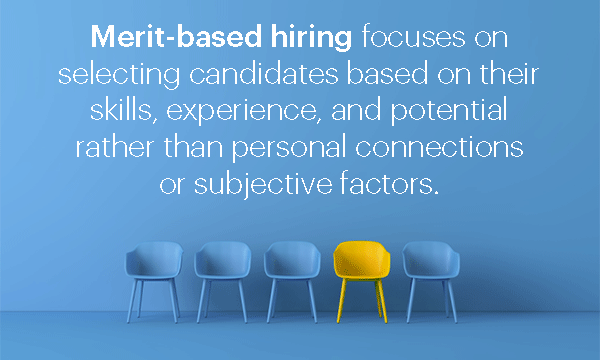Merit-Based Hiring Under the Trump Administration
By Jackie Throop, SPHR, Director, Outsourced HR & Recruiting Services
Published February 18, 2025
On January 21, 2025, President Trump signed an executive order aimed at ending illegal discrimination and restoring merit-based opportunity. We’re currently awaiting a report from the U.S. Attorney General that will identify which DEI programs or principles constitute illegal discrimination or preferences. For more information, see our February 11 article “Trump’s Executive Order and DEI in the Private Sector.”
In the meantime, what is meant by merit-based opportunity or merit-based hiring?
Merit-based hiring focuses on selecting candidates based on their skills, experience, and potential rather than subjective factors or personal connections. When done right, this approach leads to a more qualified workforce, improved performance, and greater organizational success.

There are many benefits to merit-based hiring:
- Ensuring fairness and objectivity. Hiring decisions are made based on measurable qualifications and demonstrated competencies, reducing the influence of biases.
- Increasing workforce productivity. Employees selected based on merit tend to be better suited for their roles, leading to enhanced job performance and engagement.
- Enhancing diversity and inclusion. By focusing on skills and qualifications (rather than one particular trait), organizations can attract a wider pool of candidates and create a more diverse workplace.
Keep in mind that all hiring practices should be implemented in a way that complies with federal and state anti-discrimination laws. To successfully implement a merit-based hiring process while maintaining legal compliance, consider the following steps:
- Develop clear job descriptions. Define the key competencies, skills, and experience required for each role.
- Standardize interview questions. Use structured interviews and objective scoring criteria to evaluate all candidates fairly.
- Utilize reliable and valid skills-based assessments. Consider work samples or competency tests to gauge a candidate’s ability to perform job-related tasks.
- Train hiring managers. Provide training on implicit bias, fair hiring practices, and legal compliance.
- Monitor hiring outcomes. Regularly review hiring data to ensure that the process remains equitable and does not result in disparate impact on protected groups.
Our goal is to hire qualified employees. By implementing structured, fair, and legally sound hiring practices, employers can cultivate a talented team while mitigating legal risks.
HR Source members with questions should contact us through the HR Hotline Online or at 800-448-4584.